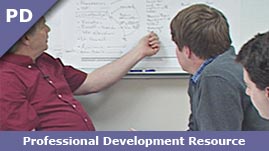Teachers' Domain - Digital Media for the Classroom and Professional Development
User: Preview

Source: Making Learning Real: "Problem Analysis/Field Insights"
This media asset is from Making Learning Real: "Problem Analysis/Field Insights."
In Problem-Based Case Learning (PBCL), student teams develop and present solutions to real-world problems. In this video from Making Learning Real, an instructor talks about using PBCL in his architectural design class where his students are tasked with the problem of designing a college wellness center. He describes a PBCL tool, the Need To Know Board (NTKB), as a "thought process board" and explains how students use the board to identify facts, assumptions, questions, and resources. The video then shows the students visiting an industry expert—a construction site superintendent—out in the field where they put their questions to him. Based on his answers and their field observations, the students move forward with developing a plan for the wellness center.
In Problem-Based Case Learning (PBCL), students apply their knowledge to real-world problems. The PBCL process is a cycle that unfolds in nine stages, starting with an instructor and a business partner identifying a business problem and presenting it to the class.
This video demonstrates the fourth stage, Problem Analysis, during which students define the problem for themselves. PBCL has tools to assist with this process. One tool, the Need To Know Board (NTKB), helps students organize facts, assumptions, questions, and resources related to their problem. Students use the board to organize their thoughts, think about the problem, and consider what they must do to develop solutions.
This video also features the fifth stage of PBCL, Field Insights, during which students conduct research, get answers to their questions, and organize this information, again using the NTKB as an analytical tool.
 Loading Standards
Loading Standards